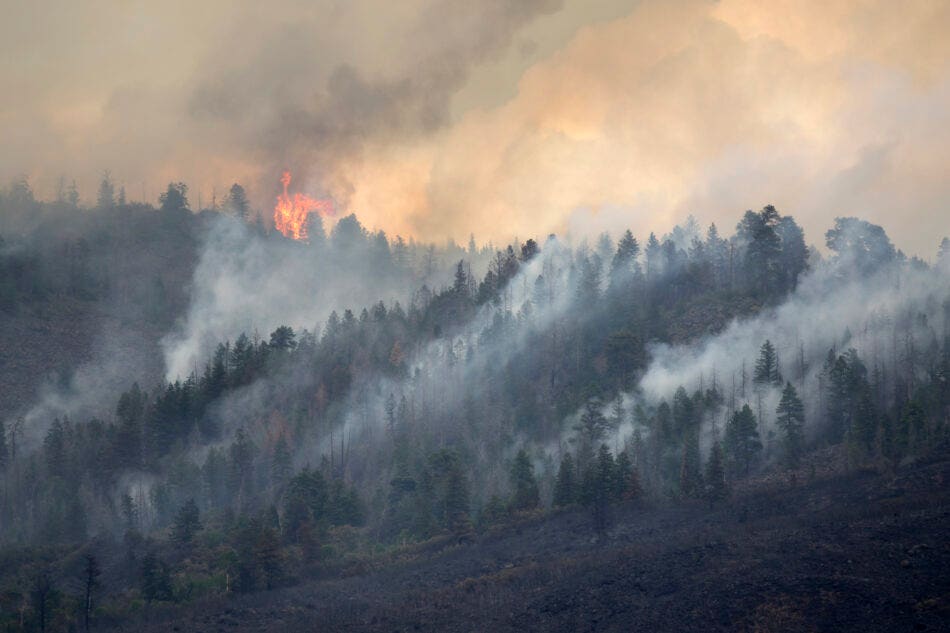Summer in Canada is synonymous with long, sunny days, warm evenings and, increasingly, wildfires.
Even if a blaze doesn’t present a direct risk, the resulting smoke can travel far and wide — as summer 2023 showed when thick haze from wildfires in British Columbia and Alberta blanketed Ontario, Quebec and the eastern United States, plummeting overall air quality levels to record lows for Canada.
With several provincial governments predicting another significant wildfire season in 2024 due to dry winter conditions across much of the country, it’s important to understand how to protect yourself from the adverse impact that wildfire smoke can have on your health.
How wildfire smoke can affect your health
Wildfires release a mix of pollutants into the air, of which fine particulate matter is the main driver of health concerns, as they can get deeply lodged in our lungs and bloodstream when inhaled.
According to Health Canada, wildfire smoke can cause several symptoms, which range from mild to severe.
Mild symptoms commonly associated with wildfire smoke exposure, which typically do not require medical attention, include:
- Headaches
- Cough
- Runny nose
- Phlegm
- Irritation of the eyes, nose and throat
More serious symptoms associated with wildfire smoke exposure, and which may require medical attention, include:
- Dizziness
- Chest pain
- Severe cough
- Shortness of breath
- Wheezing and asthma attacks
- Heart palpitations
Certain individuals are also more susceptible to health issues related to wildfire smoke. This is why health authorities generally recommended that seniors, pregnant people, infants and young children, those who work outdoors and those with chronic health conditions take extra precautions to minimize their exposure to wildfire smoke.
Remember, your pets can also be affected by wildfire smoke, so it is advised to keep them indoors as much as possible with access to fresh water.
The threat of wildfires and health implications of wildfire smoke exposure can also cause stress. If you or someone you know needs support, please refer to the provincial, territorial and national mental health resources outlined on the Government of Canada’s website.
How to protect yourself from wildfire smoke
The best way to protect yourself from wildfire smoke is to minimize your exposure to it.
While it’s especially important to be vigilant of minimizing wildfire smoke exposure on days when thick haze spikes the Air Quality Health Index to extreme highs, Health Canada recommends taking precautions when wildfire smoke is milder as it can still cause health complications.
Here are some tips to minimize your exposure to wildfire smoke:
- Stay indoors, closing windows and doors, as well as fresh air intakes from your furnace, fireplace or stove. If it’s a hot day and you do not have air conditioning, consider spending time at a cooler establishment to escape the heat and smoke.
- Reduce additional sources of indoor air pollution by avoiding the use of wood stoves, gas stoves, candles and wood fireplaces; by not smoking or vaping indoors; and by not vacuuming during smoky conditions as this can stir up dust and particulate matter.
- Use high-quality air filters and ensure you regularly replace them with clean ones. Health Canada recommends a HEPA filter.
- Invest in an air purifier, which can help remove pollutants and particulate matter from inside your home.
- When driving, keep your windows and sunroof closed, and also turn off the fan system that pulls in outside air.
- If you must be outdoors, consider wearing a respirator-type mask, such as a certified N95 mask.
- If conditions are particularly bad and causing health problems, consider temporarily relocating to another location with cleaner air (check your provincial or territorial air quality website to find a location that could offer much-needed relief).
Some additional measures that can help minimize symptoms related to wildfire exposure — such as throat and eye irritation — include:
- Staying well-hydrated.
- Using humidifiers.
During smoky periods, it is also advised that you reduce exercise and strenuous activities that result in hard breathing in order not to put further strain on your lungs.
How to stay informed
Regularly check your local news sources and air quality reports for the latest status on wildfire smoke in your area.
The Government of Canada provides the Air Quality Health Index for locations across the country, which it updates hourly.
Additional wildfire resources
- Protect your home from wildfires | Learn about the proactive measures you can take to protect your home from wildfires.
- Wildfire insurance 101 | Learn about the common coverages that offer protection in the event of wildfire and smoke damage.
- Wildfire safety guide | Review these safety tips, including actions to follow if placed under evacuation alert or order.

